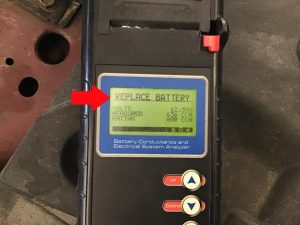Car Battery Replacement: When is it time for a new battery?
 No matter how well you treat your vehicle, car batteries will wear out every few years and need to be replaced.
Before you go out and buy a new car battery at your local auto parts store, it’s important to investigate with your mechanic to make sure that's the right fix for your existing car battery.
No matter how well you treat your vehicle, car batteries will wear out every few years and need to be replaced.
Before you go out and buy a new car battery at your local auto parts store, it’s important to investigate with your mechanic to make sure that's the right fix for your existing car battery.
Battery Exhaustion
First of all, it's really important to understand the difference between a battery that's exhausted and a battery in need of replacement. A dead car battery could simply be the result of a bad alternator or even corrosion on the battery posts, as shown above. To test your battery's viability, your mechanic will measure the battery's voltage, and use a professional battery charger to get it started again. They might also top off water levels if your battery design allows access to the cells. In some cases, you’ll find old batteries can still run for a while as long as they are properly maintained; in others, it’s better to be safe than sorry.Read more: Here's what to do if your battery light comes on.
Battery Replacement
If your battery is too corroded, or won't hold a charge, you'll need to get it replaced. When it comes to finding a battery replacement, you can often choose between a classic (a.k.a. lead-acid battery) or a more expensive (but, admittedly superior) lithium-based technology. Most times, a classic battery will get the job done–and without breaking the bank. If you have an older vehicle that you don't want to pour extra money into, a lead-acid battery is a way to go.Read more about the dangers of battery corrosion.
Lithium batteries, on the other hand, can cost a few hundred bucks but many say they're well worth the price, especially on a newer vehicle. Lithium batteries feature a near 100% efficiency when charging, can last up to 10x more cycles, and have a far superior lifespan. For some drivers, this can be a better option for battery replacement, as long as you don’t mind paying a little more.
